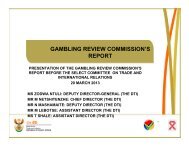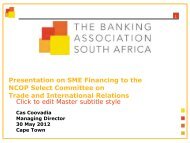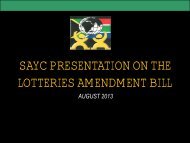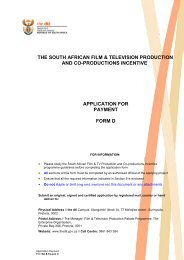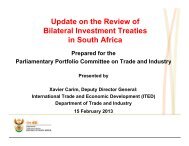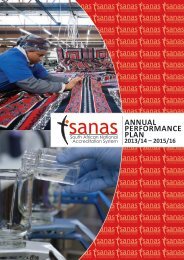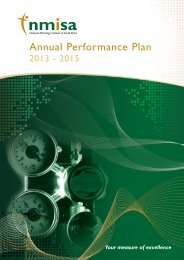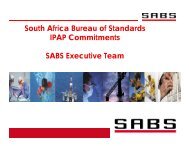Copyright Review Commission Report - ICT Law and Regulation ...
Copyright Review Commission Report - ICT Law and Regulation ...
Copyright Review Commission Report - ICT Law and Regulation ...
- No tags were found...
Create successful ePaper yourself
Turn your PDF publications into a flip-book with our unique Google optimized e-Paper software.
Work permits;Royalty collection – transparency;Historical injustices – redress;Recognition of our musical legacy;Allegations of racism; <strong>and</strong>Recording – access to facilities, setting up of infrastructure <strong>and</strong> profit <strong>and</strong> not-for-profit partnerships.The MITT met from 28 February to 3 March 2000 at the Johannesburg International Holiday Inn. Two days werededicated to public hearings. Individuals <strong>and</strong> industry organisations from across the country made oral <strong>and</strong> writtensubmissions to the MITT. The remaining three days were dedicated to the deliberations of the MITT. 2In addition, the MITT held five regional hearings in Pietersburg, Bloemfontein, Durban, Cape Town <strong>and</strong> Port Elizabethfrom 8 May to 2 June 2000 in order to ensure that a wide spectrum of South Africans were able to make submissions.The outcomes of these hearings have been incorporated into the report.2.INTRODUCTIONMusic is a fast-growing industry with limitless potential. As one of South Africa’s most significant cultural industries, themusic industry is a powerful means of enhancing the country’s identity <strong>and</strong> distinctiveness, while simultaneously creatingemployment, developing human skills <strong>and</strong> generating social capital <strong>and</strong> cohesion.The music industry, however, like any South African industry, is infused with the legacy of apartheid's political economy.As a cultural industry, the music industry suffered additional setbacks because indigenous culture was activelysuppressed <strong>and</strong> distorted by the apartheid regime. One of the most devastating aspects of this legacy is that local musicis not developing as fast as it should. Eighty per cent of the music sold in South Africa is international. Whileinternational music is thriving in the South African market, the development of local music is not keeping pace. 3Likewise, live music venues <strong>and</strong> productions are not thriving in South Africa.The MITT attempts to recommend strategies whereby both the cultural <strong>and</strong> economic potential of music can be realisedwithin this context.The MITT is part of a wider initiative of the Cultural Industries Growth Strategy (CIGS). The starting point of CIGS is arecognition of the global movement towards an information or knowledge economy. This change has seen a world-widedecline in the job-creating potential of the traditional sectors of the economy - both the primary industries <strong>and</strong>manufacturing - <strong>and</strong> the growth of “value-added” jobs. These “value-added” jobs are created in sectors like advertising,finance, consulting, media, tourism, fashion design, <strong>and</strong> a range of activities, traditionally classified under “services”.South Africa is fortunate enough to have a strong cultural sector, rich in potential <strong>and</strong> emerging talent to feed <strong>and</strong> sustainits further growth. The MITT’s recommendations attempt to harness this extaordinary talent <strong>and</strong> originality in the SouthAfrican music industry.2 The MITT process <strong>and</strong> subsequent call for submissions was advertised extensively through the print media, electronic media <strong>and</strong> viathe internet..3 ASAMI figures (Annexure A), illustrate the decline in local music sales.- 167 -







